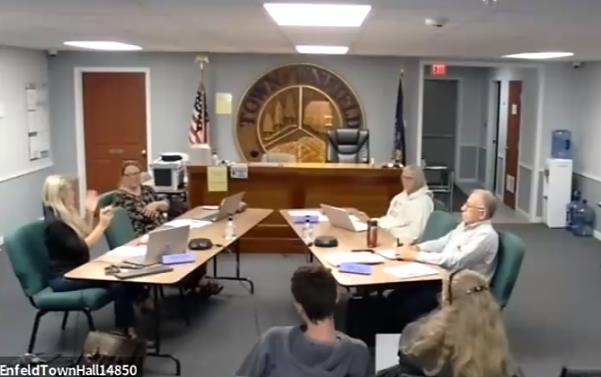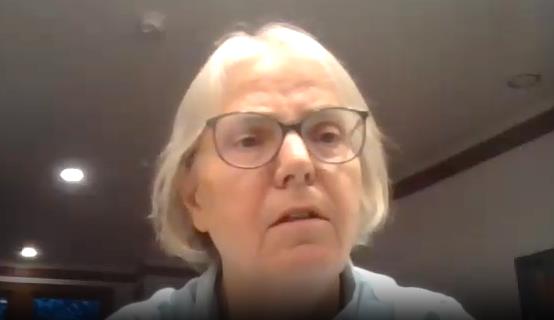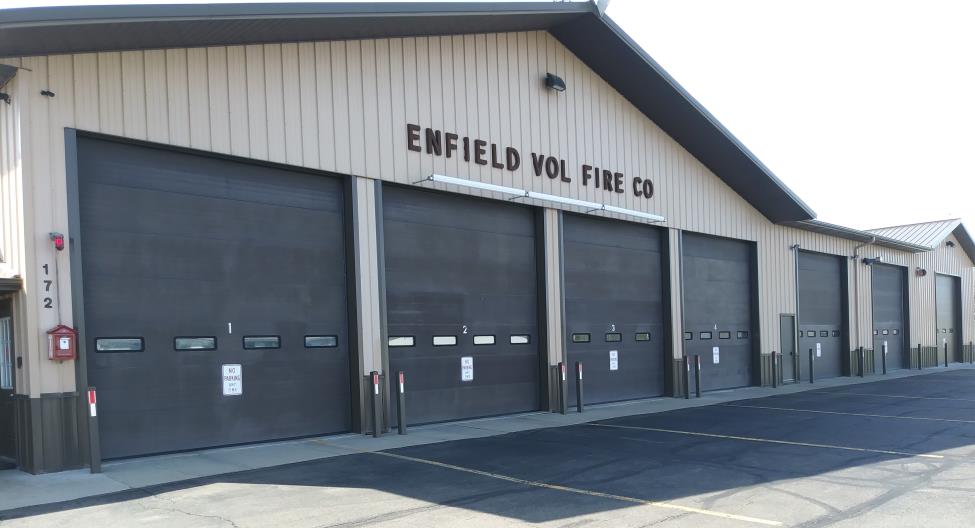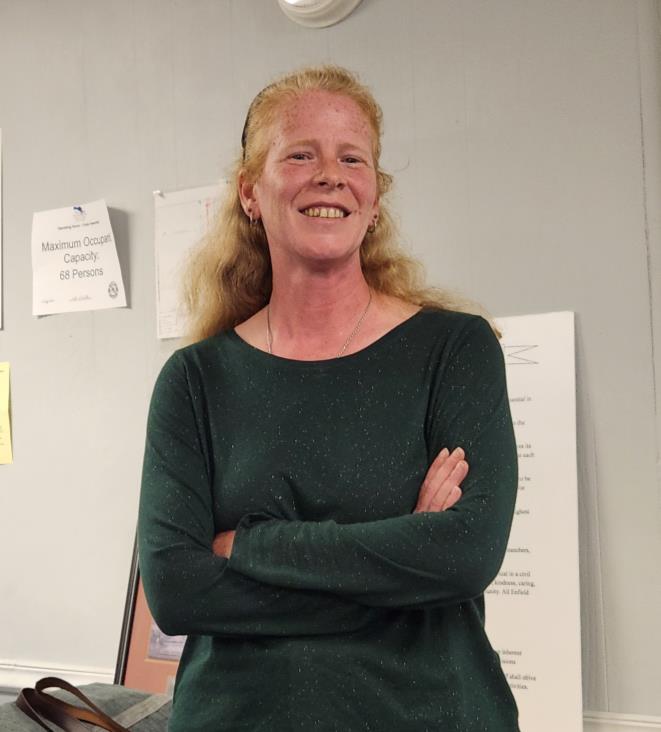EVFC ARPA grant may see unwelcome Town Board tweak
by Councilperson Robert Lynch, September 17, 2023
A Town of Enfield $20,000 appropriation to its Fire Company, funds originally intended to buy training gear and perhaps take the first steps toward a volunteer bunk room, would be redirected to the unglamorous task of paying legal fees, according to a proposal by one Enfield Councilperson, advanced at a Town Board meeting this past week. And some in the Enfield Volunteer Fire Company (EVFC) don’t like the idea.

“I definitely do not think it’s appropriate to pay (attorney) Brad Pinsky with those funds,” EVFC Secretary, firefighter and EMT Ellen Woods said Saturday. “We applied for them, just like the Community Council and Food Pantry, with specific vital service projects in mind.”
“This definitely needs some detailed discussion for sure,” Fire Company President Dennis Hubbell wrote in an email Thursday, his comment in response to this writer’s inquiry.
But the problem’s more complicated than it first looks. At least Enfield Councilperson Jude Lemke thinks it is. And that complexity, Lemke insists, was brought on by the Town Board’s transfer of fire service oversight to a Fire District and its Board of Commissioners this past summer.
The $20,000 Fire Company set-aside the Town Board approved in May was to pass through a slice of nearly $350,000 Enfield received from the federally-funded, but paperwork-burdened American Rescue Plan (ARPA). And Lemke told the Town Board Wednesday that the Town’s decision in June to transfer fire service governance imposes a new wrinkle that she and Fire District attorney Brad Pinsky “brainstormed” to solve.
“It would appear that because the Fire District is a separate governmental entity, they would be required to actually set up their own ARPA account and do all their reporting,” Lemke informed the Town Board. “And it is a pain in the neck,” she said. “For $20,000, it doesn’t make any sense.”
With the clear support of Town Supervisor Stephanie Redmond, Lemke Wednesday advanced a controversial work-around. Lemke proposed the Town Board “revoke” its May decision to appropriate the $20,000 to meet the EVFC’s equipment and facilities’ needs. The Town, instead, would keep the ARPA money in its own coffers to pay the legal bills Pinsky has racked up in guiding the fledgling Fire District into formation.
But the Pinsky/Lemke collaborative idea never came to a vote Wednesday. And it didn’t get there largely due to this writer/Councilperson’s objections.
“I’d like to hear what the representatives of both the Fire District, that is the Board of Commissioners; and the Fire Company, which is a separate legal entity, have to say about this first,” Councilperson Robert Lynch said to the Board.
“OK, we can postpone,” Supervisor Redmond answered with a sigh.
This latest turn of events is just the latest in a many months-long struggle by the Enfield Volunteer Fire Company to get added Town Board help in both meeting its needs and keeping its volunteers safe.
Last fall, the EVFC requested the Town budget an additional $25,000 to cover replacement “Turnout Gear,” protective outerwear, for its firefighters. Despite packed volunteer attendance at an October budget hearing, the Town Board’s majority—with Lynch the only supporter—declined to amend the budget and reopen the multi-year fire contract to fund the equipment. Instead, the Town Board designated ARPA money for that purpose.
But then, this May, when tentative plans called for granting equal ARPA awards, of $45,000 each, to the Enfield Food Pantry, the Enfield Community Council, and the EVFC, Councilperson Lemke succeeded in subtracting from the Fire Company’s allotment the Turnout Gear money previously pledged. It left fire volunteers with the mere $20,000 ARPA grant that’s now at issue.

Yet with Lemke’s current revision, anything that stood on the Fire Company’s wish list— including planting seed money for an ambitious and much more expensive bunk room project—stands in jeopardy. There’s no assurance that if the Town Board redirects the ARPA funds to pay Pinsky’s legal bills that the EVFC’s new funding overseer, the Board of Fire Commissioners, will ever replenish the facilities’ funding that the ARPA cash would have brought.
“If the Fire District and the Fire Company are satisfied with this, that’s fine,” this writer, Councilperson Lynch, remarked, as the Town Board prepared to park the Lemke plan in the corner for the night. “But what I don’t want to do is make a decision and be badgered by certain people from the Fire Company saying, ‘You sold us out again.’ OK?”
There’s an additional question yet to be answered. Who actually owes Brad Pinsky his money? The Town Board in March authorized the Supervisor retain legal counsel to study the Fire District’s potential formation. The Town Board granted a further authorization in April. Pinsky’s contract quoted a $15,000 fee. But in subsequent meetings, the attorney himself indicated that the Fire District, not the Town, would pay those fees, and not likely do so until the District, itself, sees money coming in early next year. Even the Town Bookkeeper said Wednesday she remembered it that way. Yet Supervisor Redmond recalls it differently.
“So what he told us, too, is that if we did not pay for that $15,000, after the Fire District was formed, that $15,000 then becomes the Fire District’s responsibility,” Redmond told Wednesday’s meeting. “So we could choose to walk away, leave them with that $15,000 and still give them that $20,000 for the ARPA funds as a separate thing, and they could go through all that headache of all that reporting.”
“That’s what I recommend we do,” I responded.
“I don’t think you understand how bad the reporting system is,” the Supervisor rebutted. “I would pay $20,000 not to have to do the reporting,” Redmond quipped. She’s already had to shoulder reporting for the Town’s other ARPA appropriations.
“It’s a wash,” Lemke maintained. “And then they (the Fire Commissioners) won’t have to go through the hassle of setting up an account and doing all the reporting.”
“But I think the Enfield Volunteer Fire Company wants things. They don’t want legal bills paid,” I responded.
“They’ll already have to pay the legal bills, anyway,” Redmond insisted.
“The Fire Company doesn’t, the Fire District does,” I said. “That’s a different entity.”
“But we’re not going to give the money to the Fire Company, and they give it to the Fire District,” Lemke asserted. “And so it makes better sense to do this and help them out to avoid the hassle.”
And here’s where it gets very puzzling for any layperson not steeped in New York Fire Service Law. The EVFC is a chartered, independent, non-profit corporation. The Fire District is the oversight arm of government. It assumes the role previously held by the Town. At least, logic would lead to that conclusion.
“Are we sure we can’t give the money to the Fire Company, not the Fire District?” I questioned. “Has somebody made a legal determination that we can’t give the money to the Fire Company for things?”
“Why would we do that, because they’re going to turn around and sell those stuff (sic) to the Fire District,” Lemke asked, bewildered by my question.
“They don’t have to, do they?” I replied.
“Yes, they do,” Fire District Treasurer Cortney Bailey corrected me.
“Well, they don’t have to. It can be donated,” Highway Superintendent Barry “Buddy” Rollins, the only appointed Fire Commissioner in the room, qualified the Treasurer’s statement.
“It can be donated,” Bailey acknowledged. “Either way, these things become the Fire District’s.”

Of course, the Fire District and the EVFC can negotiate any kind of deal they want. But I find it hard to believe that the Fire District, unlike the Town Board, can just swoop down and snatch assets from the Enfield Volunteer Fire Company short of exercising its independent legal right of Eminent Domain. And that requires going to court.
The EVFC owns its trucks, its hoses, and its building. Pinsky has previously said the District may choose to lease, rather than buy, the trucks. And Commissioners have made it clear they have no intent to buy the Enfield Company’s fire house. For one thing, if they did, they’d have to pay contractors New York State’s prevailing wage anytime someone fixed a leaky faucet.
But of course, anyone can see why Brad Pinsky would like ARPA’s funding reassignment. That way, he gets paid his fees now, rather than later.
“Our ARPA request said nothing about money to pay an attorney,” EVFC President Hubbell said in a statement to this Councilperson Sunday. “Our requests were for certain items just like every other organization that applied,” the Company President added. “We already got $25,000.00 deducted from our ARPA request for items not requested, but for items the Town Board chose to reduce the budget.” (Hubbell was referring to the 2022 Turnout Gear.)
Yet Councilperson Lemke’s belief in near- total Fire Company subservience to the will of the Fire District took an interesting twist Wednesday when talk turned a few minutes later to why the District Commissioners do not want to quarter their administrative office within the EVFC’s fire station. And because they don’t, the Town Board will allow them to set up temporary quarters in an unused cubbyhole office just off of the Town Board’s meeting room.
“Why can’t the Fire Commission have offices over at the Fire House?” I asked.
The Secretary and the Treasurer could find themselves in an office with no Commissioners present, Bailey replied. “(It) means that your Treasurer and your Secretary are open to being trapped into a conversation that they shouldn’t even be in in the first place. It just leaves—there should be a division.”
“How’s Lansing do it? How’s Dryden do it?” I asked. Those communities have fire districts too.
“I don’t know,” Bailey admitted.
****
Cortney Bailey donned two hats at Wednesday’s Town Board meeting. Minutes before she assumed her Fire District Treasurer’s role, she also guided to approval a $45,000 ARPA appropriation to the Enfield Community Council, an organization she oversees as President.
Back in May when the EVFC appropriation was initially approved, the Town Board designated the ECC money as well. But the fine details were never worked out. Exactly how would the Community Council use the cash?

The final plan, approved by all four attending Town Board members (Councilperson James Ricks was excused) would carve the money into three annual installments and designate it to fund “community programming” to benefit “youth, family and individuals of all ages.” The earlier May Resolution had listed only youth programming.
“We asked questions. Who wants to see what?” Bailey said in describing how ECC staff fine-tuned their current recommendations. And she said the agency found the previous youth-only target too restrictive.
“What our people actually need is to be brought back together as a community,” Bailey told the Town Board. “Because COVID definitely pushed us all into our little holes,” she observed, “and we want to pull them back in and say, no, we’re all one community.”
Examples Bailey gave of possible ARPA deployment would be to fund family field trips to baseball games, or the construction of a skating rink or a “gaga pit.”
Among other Enfield Town Board business Wednesday:
- The Town Board awarded Lambert and Sons’ low bid to pave the basketball court behind the ECC’s Community Center. It’s a court once constructed by its former owner, the Living Water Church, but long left abandoned and since overgrown by soil and turf. Tompkins County awarded the Town a $5,000 grant to repave the court, but quotes this summer came in higher than expected. And the overrun delayed the project’s award for months. Wednesday’s approval came after Town Highway Superintendent Barry Rollins agreed to provide—and the Town Board authorized—Rollins’ staff to assist in site preparation. That agreed-to teamwork, along with the grant money, should contain the Town’s own projected outlay to $3,000.
- And the Town Board approved, in concept, revisions in the Town’s Personnel Manual. Its principal change will, for the first time, qualify part-time employees working 20 hours or more per week for paid health and dental insurance. Prime beneficiaries of this change will be the Town Clerk, Town Supervisor, and the Code Enforcement Officer. The policy change will likely take effect with the New Year.
###

